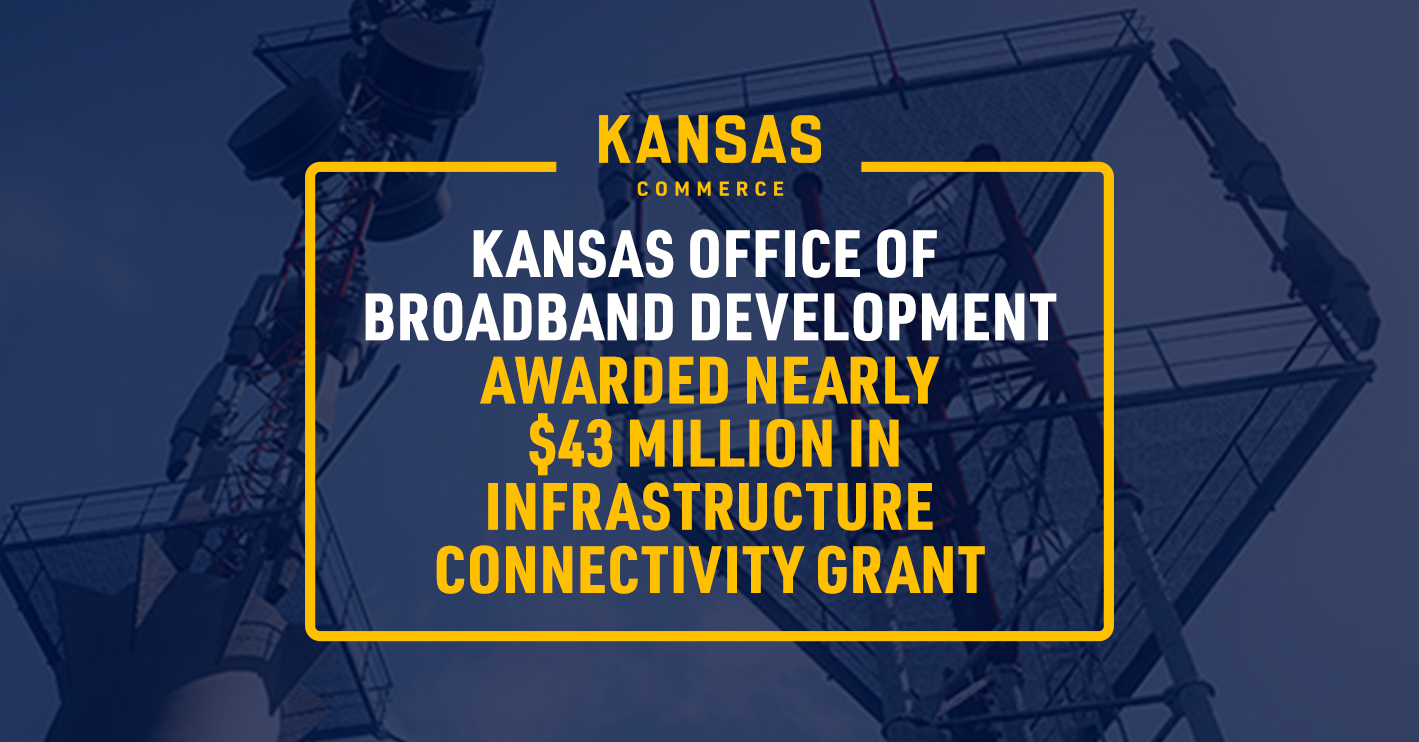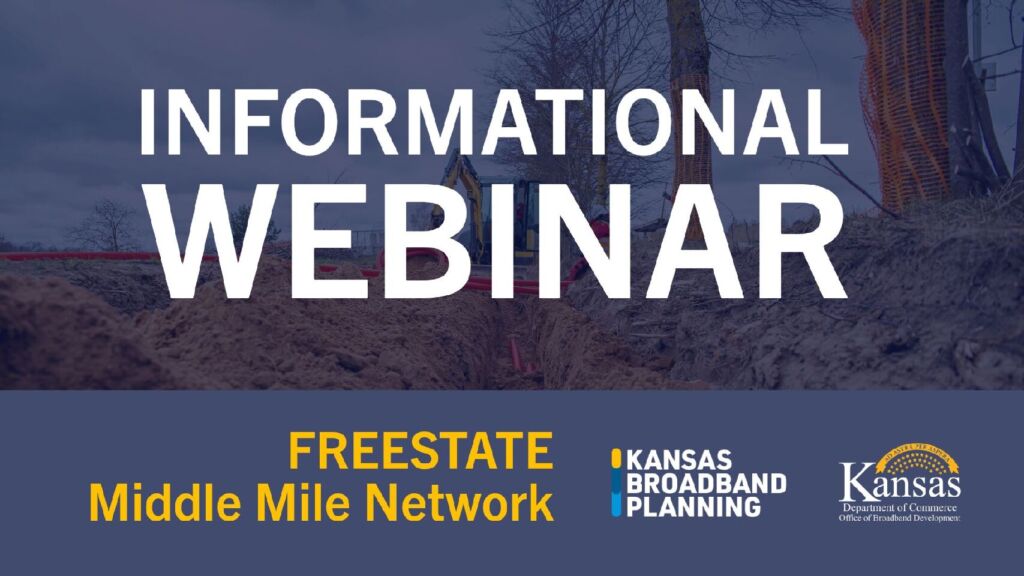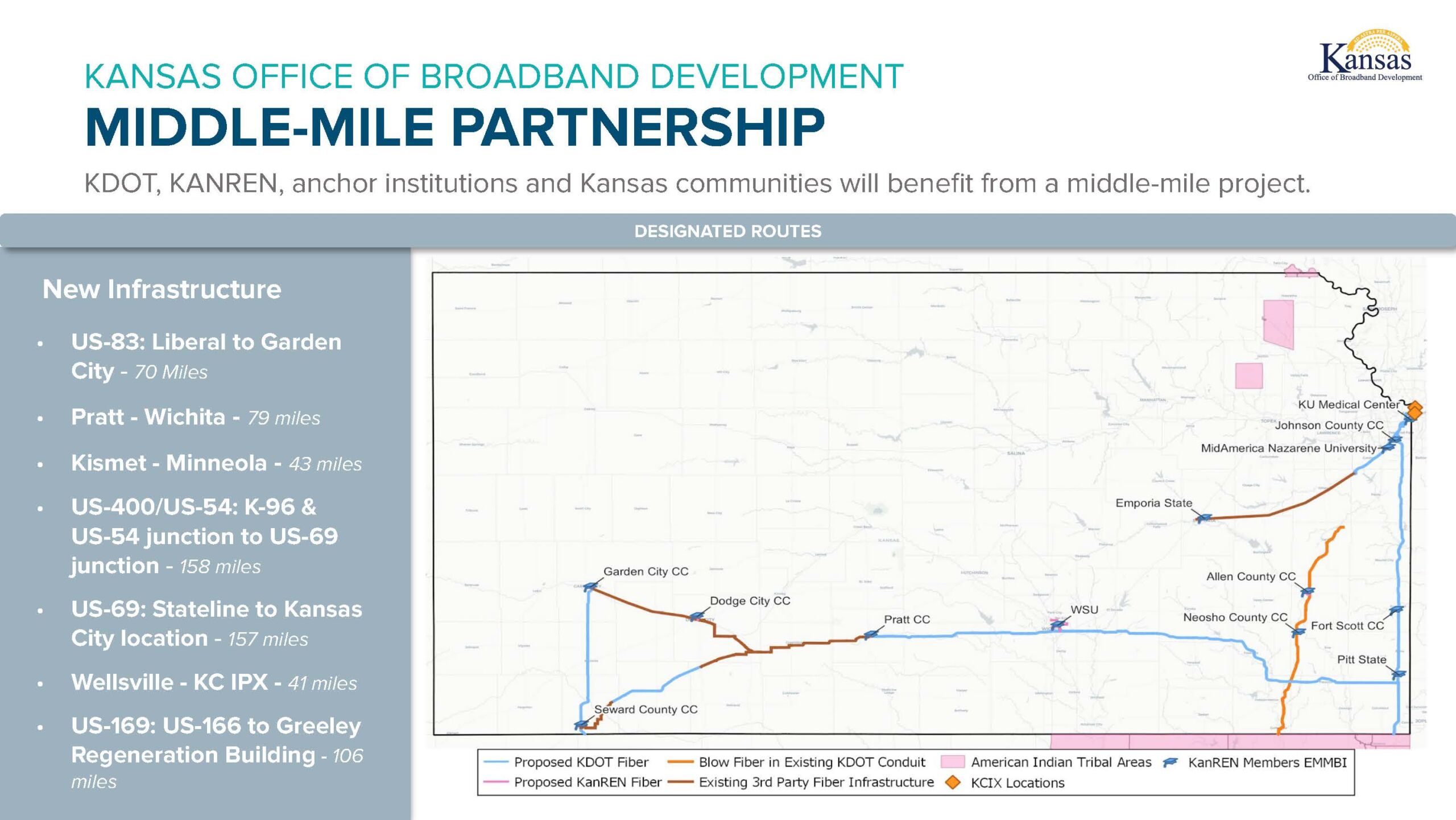
Kansas Office of Broadband Development applied for the Enabling Middle Mile Broadband Infrastructure (EMMBI) program, a competitive grant opportunity funded through the Infrastructure Investment and Jobs Act, last September. EMMBI is administered by the National Telecommunications and Information Administration (NTIA) and is focused on the construction, improvement, or acquisition of middle mile broadband infrastructure. An open-access, middle mile network is important to Governor Kelly’s goal to bring high-speed, affordable broadband to every Kansas home and business as it allows for multiple providers to enter new markets in underserved areas.
“This award signals Kansas’ leadership in our efforts to bring affordable broadband to all and our strength in forging statewide partnerships to bridge the digital divide. This collective effort has led to another big win for broadband expansion.”
Governor Laura Kelly

Program Information
Background
The State of Kansas Departments of Commerce (the applicant) and Transportation (KDOT) (project partner) are working together with private and non-profit partners to create a 682-mile open-access middle mile fiber optic and network, with plans to connect multiple new internet exchange points throughout the State. The purpose of the project is to connect to multiple new internet points throughout the State and offer dark fiber for last-mile service providers that have the capabilities to light the fiber and need the scalability associated with dark fiber access. The proposed route will provide lit service access to support smaller ISPs as well as other providers with smaller project scopes that prefer lit services to deploying their own fiber or electronics. This will enable last mile providers with a range of objectives to connect to this network and access end users.
The Freestate Middle Mile Network will support the needs of last-mile service providers, increase capabilities for anchor institutions, enable connections to unserved and underserved households, and increase competition in local markets, thereby creating more affordable service options.

Informational Webinar – 04/19/2024
KOBD hosted an informational webinar on the Freestate Middle Mile Network. Below you will find links to the recording and the slides.
As mentioned in the webinar, Connected Nation has been a valuable advisor on duct strategy for the FREESTATE Middle Mile Network during pre-construction. They will be transitioning away from that role in the near future in order to focus on their core mission and IXP expansion opportunities. NTIA has approved the substitution of another partner to serve as neutral duct administrator. More information will be forthcoming.
The Freestate Middle Mile Network will support the needs of last-mile service providers, increase capabilities for anchor institutions, enable connections to unserved and underserved households, and increase competition in local markets, thereby creating more affordable service options.
Freestate Middle Mile Basics:
Activities to be Performed: Project will use fiber to build new middle mile network through underserved communities with a commitment to open access and carrier neutral non-discriminatory interconnect. The period of performance is expected to be 4 years.
Expected Outcomes: The project has the following goals and deliverables:
1. Create a 682-mile open-access middle mile fiber optic network (Freestate Middle Mile Network), with plans to connect multiple new internet exchange points throughout the state
2. Incorporate three primary open-access middle mile facilities to facilitate broadband access deployment across the state for all scopes and sizes of broadband deployments
3. Support access to middle mile for the deployment of last-mile service provider’s fiber optic cables
4. Support leased access to dark fiber for last-mile service providers that have the capabilities to light the fiber and need the scalability associated with dark fiber access
5. Provide lit service access to support smaller ISPs as well as other providers with smaller project scopes that prefer lit services to deploying their own fiber or electronics
Intended Beneficiaries: The Freestate Middle Mile Network will pass within 5 miles of approximately 27,000 underserved locations and about 300 unserved locations. In addition, 52 anchor institutions are within 1,000 feet of the proposed network paths. A significant portion of the fiber will go through counties that have higher poverty rates than the national average.
The areas that will benefit from this project include the southern part of Kansas and routes from Garden City, through Wichita and out and up to Kansas City. The network will benefit educational facilities throughout Kansas by enabling Kansas Research and Education Network to expand its bandwidth and geographic reach. KDOT has also committed to allowing access to other state and government entities including the Department of Defense and the Department of Agriculture to aid in national security efforts and smart-farm initiatives in Kansas.
The proposed Freestate Middle Mile Network will bring open access middle mile infrastructure across the state on east-west and north-south routes, creating opportunities for new last-mile market entrants to deliver services at lower costs for residential and business customers. The network will also connect internet exchange points, leading to better performance, more resiliency, and lower costs for regional providers and their customers.
Q. What is middle mile?
A. Middle mile is the section of the broadband network that connects the global network to the local network (last mile) that brings internet directly into homes and businesses. Middle mile facilities provide fast, large-capacity connections ranging from a few miles to a few hundred miles.
Q. Why is it needed?
A. Internet service providers pay monthly fees to connect to middle mile networks. These lease fees can be high and are negotiated at different rates for different companies. These rates can prevent providers from going into rural areas where the return on investment cannot justify the buildout costs. High fees are also passed on to the internet customer, making monthly broadband costs higher in rural areas without middle mile infrastructure. An open-access model for middle mile, like the one funded by this grant, will allow an internet service provider to connect to middle mile infrastructure at the same wholesale rate that any other provider is charged. Driving down the access fees for middle mile infrastructure through an open-access model will enable more providers to enter previously unserved markets.
In addition to helping narrow the digital divide, middle mile infrastructure can:
Q: Who are the partners involved in the project and how were they selected?
A: The following are the key public and private partners that are part of the plan for Kansas Middle Mile Network (KNET): Commerce houses the Kansas Office of Broadband Development (KOBD), led by Director Jade Piros de Carvalho, who will oversee all elements of this program and serve as the Authorized Organizational Representative (AOR).
To implement KNET, KOBD and KDOT released a competitive request for information (RFI) to select one or more private partners with extensive experience building, operating, and commercializing middle-mile communications networks. Based on the responses to the RFI, a committee of State leaders selected a proposal submitted by IdeaTek and Connected Nation to design, build, operate, and maintain KNET while maximizing its potential to serve the public policy goals set out by Congress for the Enabling Middle-Mile Broadband Infrastructure Program.
KDOT shares KOBD’s mission to catalyze new last-mile deployment throughout the State, particularly in unserved and underserved areas. KDOT will provide a cash match of approximately $26.5 million, as well as technical oversight of IdeaTek and Connected Nation. Additionally, KDOT will use fiber strands on the new network to support its core functions of transportation management, State-level public safety communications, emergency response, and intelligent transportation communications. KDOT Director of Multimodal Transportation and Innovation Cory Davis will be the department’s lead project coordinator.
KanREN, which is led by Executive Director Chris Crook, operates an existing circuit-based research and education network that serves the needs of more than 80 higher education entities, including the State’s research universities, community colleges, and Native American institutions of higher education such as Haskell Indian Nations University. KanREN will use some of the KDOT fiber to serve the needs of the education sector over robust, reliable, redundant fiber facilities.
IdeaTek is an experienced broadband provider that that delivers scalable, long-term fiber optic infrastructure to bridge the digital divide in rural Kansas communities. Its sales and service delivery teams will market and provide both lit and dark fiber services to anchor institutions, last-mile ISPs, and enterprise customers. Ideatek’s involvement will be led by its business development director, Thomas Garrett.
Connected Nation is an experienced nonprofit that will administer and facilitate open-access leasing of the newly constructed network to serve last-mile providers (ISPs) and anchor institutions. Brent Legg, Connected Nation’s Executive Vice President, will serve as program lead and primary point of contact for this effort.
Q: Who will own and manage the network?
A: The State Departments of Commerce and Transportation will assist in operating and managing the network, with substantial fiber assets retained by KDOT for State and public purposes, including KanREN, which will have access to dark fiber to meet the needs of the education sector. KOBD is responsible for grant oversight and reporting. The office will serve as the arbiter to ensure the network is administered in a non-discriminatory, neutral manner.
In conjunction with KDOT, IdeaTek will design, build, and maintain the middle mile network with a focus on broadening access to underserved and underserved markets, anchor institutions and high-cost middle mile service areas, and will operate the network on an open-access basis to maximize use of the new fiber facilities by a wide range of ISPs, anchor institutions, and other users.
Connected Nation will, in a neutral manner, market and lease the available open-access microduct, connected to open exchange points currently under development and consideration.
The State of Kansas will own 100% of the assets at the conclusion of the grant award period and therefore none of the ownership situations (1-7) referenced in 47 C.F.R. Section 1.2112(a) apply.
Q. How was the vendor selected?
A. KDOT issued an RFI for primary freight routes. See timeline below.
Q. What agencies are involved?
A. KOBD partnered with the Kansas Department of Transportation, Kansas Research and Education Network (KanREN), and private providers, with input from Kansas Department of Agriculture and Kansas Division of Emergency Management representatives submitted a middle mile application in September 2022.
Q. If we have further questions about anything on this grant program, who do we send our questions to for a response.
A. Use this email for all Middle Mile grant questions: [email protected]. The question will be directed to someone to log, review and then respond.
